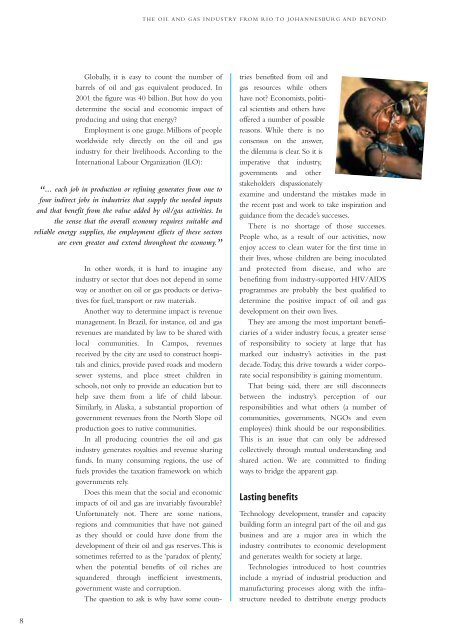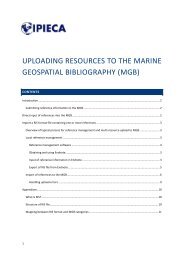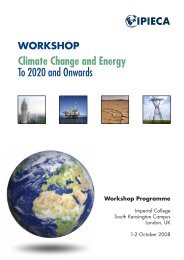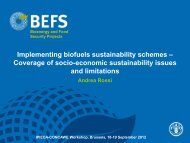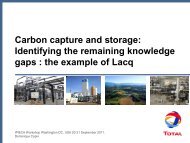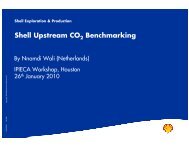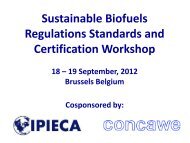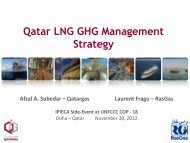WSSD Report FINAL! - OGP
WSSD Report FINAL! - OGP
WSSD Report FINAL! - OGP
Create successful ePaper yourself
Turn your PDF publications into a flip-book with our unique Google optimized e-Paper software.
THE OIL AND GAS INDUSTRY FROM RIO TO JOHANNESBURG AND BEYOND<br />
Globally, it is easy to count the number of<br />
barrels of oil and gas equivalent produced. In<br />
2001 the figure was 40 billion. But how do you<br />
determine the social and economic impact of<br />
producing and using that energy?<br />
Employment is one gauge. Millions of people<br />
worldwide rely directly on the oil and gas<br />
industry for their livelihoods. According to the<br />
International Labour Organization (ILO):<br />
“ … each job in production or refining generates from one to<br />
four indirect jobs in industries that supply the needed inputs<br />
and that benefit from the value added by oil/gas activities. In<br />
the sense that the overall economy requires suitable and<br />
reliable energy supplies, the employment effects of these sectors<br />
are even greater and extend throughout the economy.”<br />
In other words, it is hard to imagine any<br />
industry or sector that does not depend in some<br />
way or another on oil or gas products or derivatives<br />
for fuel, transport or raw materials.<br />
Another way to determine impact is revenue<br />
management. In Brazil, for instance, oil and gas<br />
revenues are mandated by law to be shared with<br />
local communities. In Campos, revenues<br />
received by the city are used to construct hospitals<br />
and clinics, provide paved roads and modern<br />
sewer systems, and place street children in<br />
schools, not only to provide an education but to<br />
help save them from a life of child labour.<br />
Similarly, in Alaska, a substantial proportion of<br />
government revenues from the North Slope oil<br />
production goes to native communities.<br />
In all producing countries the oil and gas<br />
industry generates royalties and revenue sharing<br />
funds. In many consuming regions, the use of<br />
fuels provides the taxation framework on which<br />
governments rely.<br />
Does this mean that the social and economic<br />
impacts of oil and gas are invariably favourable?<br />
Unfortunately not. There are some nations,<br />
regions and communities that have not gained<br />
as they should or could have done from the<br />
development of their oil and gas reserves.This is<br />
sometimes referred to as the ‘paradox of plenty,’<br />
when the potential benefits of oil riches are<br />
squandered through inefficient investments,<br />
government waste and corruption.<br />
The question to ask is why have some countries<br />
benefited from oil and<br />
gas resources while others<br />
have not? Economists, political<br />
scientists and others have<br />
offered a number of possible<br />
reasons. While there is no<br />
consensus on the answer,<br />
the dilemma is clear. So it is<br />
imperative that industry,<br />
governments and other<br />
stakeholders dispassionately<br />
examine and understand the mistakes made in<br />
the recent past and work to take inspiration and<br />
guidance from the decade’s successes.<br />
There is no shortage of those successes.<br />
People who, as a result of our activities, now<br />
enjoy access to clean water for the first time in<br />
their lives, whose children are being inoculated<br />
and protected from disease, and who are<br />
benefiting from industry-supported HIV/AIDS<br />
programmes are probably the best qualified to<br />
determine the positive impact of oil and gas<br />
development on their own lives.<br />
They are among the most important beneficiaries<br />
of a wider industry focus, a greater sense<br />
of responsibility to society at large that has<br />
marked our industry’s activities in the past<br />
decade.Today, this drive towards a wider corporate<br />
social responsibility is gaining momentum.<br />
That being said, there are still disconnects<br />
between the industry’s perception of our<br />
responsibilities and what others (a number of<br />
communities, governments, NGOs and even<br />
employees) think should be our responsibilities.<br />
This is an issue that can only be addressed<br />
collectively through mutual understanding and<br />
shared action. We are committed to finding<br />
ways to bridge the apparent gap.<br />
Lasting benefits<br />
Technology development, transfer and capacity<br />
building form an integral part of the oil and gas<br />
business and are a major area in which the<br />
industry contributes to economic development<br />
and generates wealth for society at large.<br />
Technologies introduced to host countries<br />
include a myriad of industrial production and<br />
manufacturing processes along with the infrastructure<br />
needed to distribute energy products<br />
8


